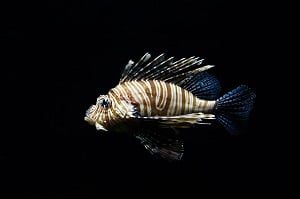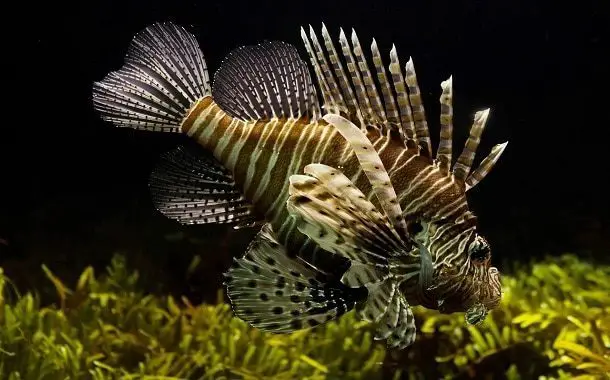How Much Does a Lionfish Cost?
Last Updated on February 6, 2024
Written by CPA Alec Pow | Content Reviewed by ![]() CFA Alexander Popinker
CFA Alexander Popinker
With their stunning stripes and flowing fins, lionfish are some of the most beautiful exotic fish available in the aquarium trade. But before you rush out to get one of these colorful creatures, it’s important to understand the costs involved with keeping them.
This guide will break down the price range for purchasing lionfish as well as the ongoing expenses for their care and tank setup.
How Much Does a Lionfish Cost?
The average price for a lionfish can range quite a bit depending on the species, size, age, and source. In general, you can expect to pay $30-60 for a juvenile specimen from a local pet store. Mature lionfish are more expensive, usually $80-150 at retail. Rarer species or specialty colors can cost $200 or more.
Online retailers tend to have lower prices than brick-and-mortar shops. You may find deals on sites like LiveAquaria.com for as low as $20 for a young lionfish. However, you’ll need to account for overnight shipping costs which can add $50 or more to the total.
Here are some examples of websites selling Lionfish:
- Black Peacock Lionfish: $79.99, on sale for $59.99
- Black Volitan Lionfish or Red Volitan Lionfish: $89.99 – $189.99
- Fu Manchu Lionfish or Twinspot Lionfish: $139.99 – $169.99
- Volitan Lionfish – Pterois volitans – Medium: $89.99
- Mombasa Lionfish – Pterois mombasae: $129.99
- Barbfish – Scorpaena brasiliensis – Medium: $49.99
- Volitan Lionfish. Pterois volitans: From $89.99
- Dwarf Lionfish. Dendrochirus zebra: From $89.99
- Radiata Lionfish. Pterois radiata: From $179.99
Adult size, health, and vibrancy of coloration impact price for lionfish. Shop around to get the best deal, but focus on finding a healthy, active fish rather than the cheapest option.
Lionfish Species
There are several species of lionfish commonly kept in home aquariums. The most popular are the Volitans Lionfish and the Fu Manchu Lionfish.
Volitans have bold red, white, and black stripes over fan-like pectoral fins. They grow to about 12 inches and make a stunning display fish.
Fu Manchus have a similar pattern but thinner bands of color. They max out around 9 inches in length.
Both species hail from the Indo-Pacific and make hardy, long-lived additions to a saltwater tank. Their venomous spines require some extra care when handling.
What Factors Influence Lionfish Price?
Size – Larger, adult lionfish command a higher price than juveniles or small specimens. A 6-inch fish may cost $50, while a 12-inch adult could be $150+.
Species – Rarer varieties like the Guinea Fowl Lionfish or Leopard Lionfish can cost two to three times as much as common Volitans and Fu Manchus.
Source – Buying from a specialty aquatic store generally costs more than online livestock retailers. Consider shipping fees for web orders.
You might also like our articles about the cost of a box turtle, an alligator turtle, or a pet fish.
Availability – Popular lionfish like Volitans may be cheaper since they are regularly captive-bred. Less common species are pricier.
Quality – Pay more for lionfish with vibrant colors and active hunting behaviors. Avoid dull, stressed, or floating fish.
Additional Costs of Keeping Lionfish
 While the fish themselves are the main investment, properly caring for lionfish does require some other equipment and ongoing costs.
While the fish themselves are the main investment, properly caring for lionfish does require some other equipment and ongoing costs.
Saltwater Aquarium – Lionfish need a minimum 30 gallon tank, although larger is better. A basic setup runs $200-300 for a tank, filtration, lighting, etc.
Heating & Monitoring – They thrive in 78-82°F water. A good heater and thermometer will cost $50-100.
Specialized Filtration – A protein skimmer helps manage waste and costs $100-200.
Weekly Water Changes – Expect to change out 10-15% of water. Salt mix and RO water costs $5-10 per month.
Food – They eat frozen seafood, pellets, or live fish. Budget $15-20 per month to feed one or two lionfish.
Safety Gear – Use puncture-proof gloves when handling due to venomous spines. A pair runs $20-30.
Tips for Buying Lionfish
- Inspect colors, fins, and eyes for signs of disease or stress
- Select active fish that swim steadily and have hearty appetites
- Buy captive-bred lionfish when possible
- Quarantine new lionfish for 2-4 weeks before adding to display tank
- Research ethical, sustainable sources like tank-raised specimens
- Join local reef clubs to find used equipment and cheaper livestock
- Be patient and avoid impulse buys for the healthiest, most vibrant lionfish
Conclusion
With their flashy fins and predatory behaviors, lionfish present a unique opportunity in marine aquarium keeping. But their beauty comes at a cost – expect to spend $300-500 for the fish and basic setup, not including ongoing care and feeding.
For enthusiasts willing to take on the challenge, lionfish can make a rewarding centerpiece fish. Do plenty of research to give them the specialized habitat they need to thrive in captivity.
Frequently Asked Questions
What is the lifespan of a lionfish?
In captivity, lionfish typically live 10-15 years with proper care and tank conditions. Some individuals may exceed 15 years. Provide them with ample tank space, stable water quality, variety in diet, and quarantine new arrivals to support longevity.
Is Lion fish rare?
Lionfish are not rare in nature, with wide distributions through the Indo-Pacific. However, some color variants like Leopard Lionfish are less commonly seen in the aquarium trade.
Popular species like Volitans Lionfish are widely available from breeders and collectors. Rarity influences cost – rarer lionfish are more expensive.
Can you keep 2 lionfish together?
Yes, you can keep 2 lionfish together in one tank provided it is large enough. 75-100 gallons is recommended for a pair. Avoid overcrowding. Monitor for aggression just like any marine fish community.
Ensure both fish are eating well. Introduce them simultaneously or the resident lionfish may act territorial. Proper tank size and compatible pairing is very important.


Leave a Reply
Want to join the discussion?Feel free to contribute!